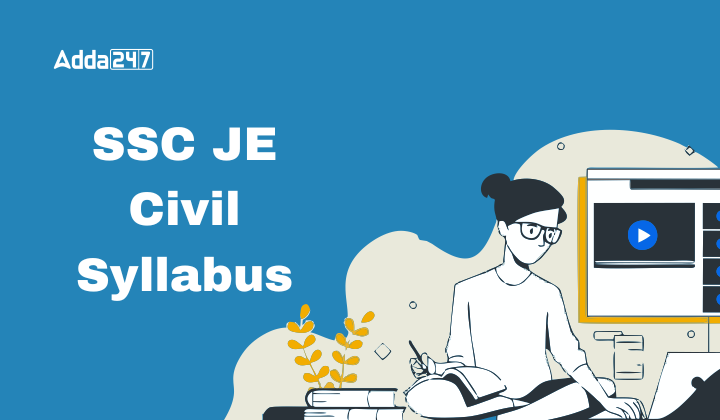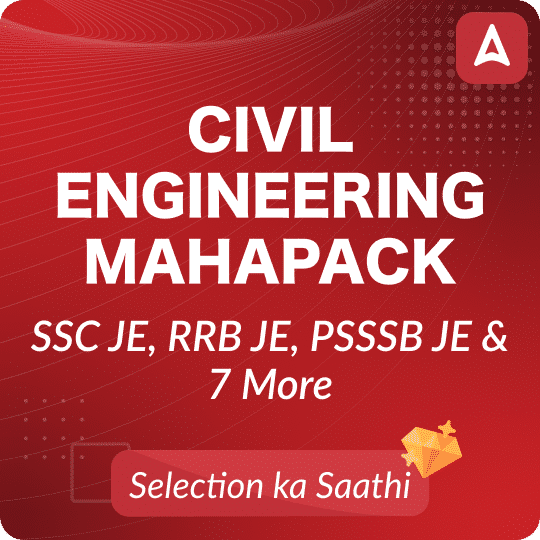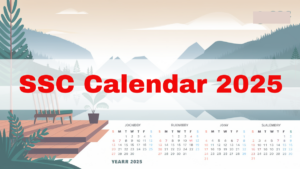Staff Selection Commission has announced the SSC JE Exam Date 2024 on the official website. The Paper 1 Exam is scheduled to be conducted on 5th, 6th and 7th June 2024 at various exam centers. As the exam date is announced candidates of Civil discipline must be looking for the detailed SSC JE Civil Syllabus 2024, understanding and knowing the syllabus is essential. In this article, we have covered the SSC JE Civil Syllabus 2024 for the Paper 1 and Paper 2 also. Candidates can check the detailed syllabus mentioned below.
SSC JE Civil Syllabus 2024
SSC JE Exam comprises of two papers i.e. Paper 1 and Paper 2.Paper 1 is common for all the disciplines. The level of the questions in Engineering subjects will be approximately of the level of a Diploma in Engineering Civil from a recognized Institute, Board or University recognized by the All India Board of Technical Education. Candidates must check the details mentioned here regarding the SSC JE Syllabus for Junior Engineer.
| Papers | Type of Examination | Subjects | Mode of examination |
| Paper 1 | Objective Multiple Choice | (i) General Intelligence and Reasoning
(ii) General Awareness (iii) Part-A General Engineering (Civil & Structural) or |
CBT (Online) |
| Paper 2 | Objective Multiple Choice | Part-A General Engineering (Civil & Structural) Part-B General Engineering (Electrical) Part-C General Engineering (Mechanical) |
CBT (Online) |
SSC JE Civil Syllabus 2024 for Paper 1
SSC JE Syllabus for Paper 1 comprises a of total three sections namely General Intelligence & Reasoning, General Awareness, and a particular discipline (Civil Engineering, Electrical Engineering, and Mechanical Engineering). Candidates of all streams need to appear for the Paper 1. Check the section-wise SSC JE Paper 1 Syllabus 2024 here.
| General Intelligence & Reasoning | General Awareness | Civil Engineering |
|
|
|
SSC JE Civil Engineering Syllabus 2024 for Paper 2
The SSC JE Civil Syllabus 2024 for Paper 2 will be held in the written format consisting of a total of 300 marks. Candidates will be required to appear for their exam group. The SSC JE syllabus for Paper 2 is given below.
| Paper – II | Total No. Of Questions | Time |
|---|---|---|
| Part-A General Engineering (Civil & Structural) | 100 | 2 Hrs. |
Building Materials
Physical and Chemical properties, classification, standard tests, use, and manufacture/quarrying of materials e.g. building stones, silicate-based materials, cement (Portland), asbestos products, timber, and wood-based products, laminates, bituminous materials, paints, varnishes.
Estimating, Costing, and Valuation
- Estimate, glossary of technical terms, analysis of rates, methods, and unit of measurement, Items of work – earthwork, Brick work (Modular and traditional bricks), RCC work, Shuttering, Timber work, Painting, Flooring, Plastering. Boundary wall, Brick building, Water Tank, Septic tank, Bar bending schedule, Centre line method, Mid-section formula, Trapezoidal formula, Simpson’s rule.
- Cost estimate of Septic tank, flexible pavements, Tube well, isolates and combined footings, Steel Truss, Piles, and pile-caps.
- Valuation – Value and cost, scrap value, salvage value, assessed value, sinking fund, depreciation and obsolescence, methods of valuation.
Surveying
- Principles of surveying, measurement of distance, chain surveying, working of the prismatic compass, compass traversing, bearings, local attraction, plane table surveying, theodolite traversing, adjustment of theodolite
- Levelling, Definition of terms used in leveling, contouring, curvature, and refraction corrections, temporary and permanent adjustments of dumpy level, methods of contouring, use of a contour map, tech metric survey, curve setting, earthwork calculation, advanced surveying equipment.
Soil Mechanics
- Origin of soil, phase diagram, Definitions-void ratio, porosity, degree of saturation, water content, the specific gravity of soil grains, unit weights, density index and interrelationship of different parameters, Grain size distribution curves, and their uses. Index properties of soils, Atterberg’s limits, ISI soil classification, and plasticity chart.
- Permeability of soil, coefficient of permeability, determination of coefficient of permeability, Unconfined and confined aquifers, effective stress, quick sand, consolidation of soils, Principles of consolidation, degree of consolidation, pre-consolidation pressure, normally consolidated soil, e-log p curve, computation of ultimate settlement.
- Shear strength of soils, direct shear test, Vane shear test, Triaxial test. Soil compaction, Laboratory compaction test, Maximum dry density, optimum moisture content, earth pressure theories, active and passive earth pressures, Bearing capacity of soils, plate load test, and standard penetration test.
Hydraulics
Fluid properties, hydrostatics, measurements of flow, Bernoulli’s theorem and its application, flow through pipes, flow in open channels, weirs, flumes, spillways, pumps, and turbines.
Irrigation Engineering
- Definition, necessity, benefits, 2II effects of irrigation, types, and methods of irrigation, Hydrology – Measurement of rainfall, run-off coefficient, rain gauge, losses from precipitation – evaporation, infiltration, etc. Water requirement of crops, duty, delta and base period, Kharif and Rabi Crops, Command area, Time factor, Crop ratio, Overlap allowance, Irrigation efficiencies.
- Different types of canals, types of canal irrigation, and loss of water in canals.
- Canal lining – types and advantages. Shallow and deep to wells, the yield from a well.
- Weir and barrage, Failure of weirs and permeable foundation, Slit, and Scour, Kennedy’s theory of critical velocity.
- Lacey’s theory of uniform flow.
- Definition of flood, causes, and effects, methods of flood control, water logging, preventive measures.
- Land reclamation, Characteristics affecting fertility of soils, purposes, methods, description of the land, and reclamation processes.
- Major irrigation projects in India.
Transportation Engineering
- Highway Engineering – cross-sectional elements, geometric design, types of pavements, pavement materials – aggregates and bitumen, different tests, Design of flexible and rigid pavements – Water Bound Macadam (WBM) and Wet Mix Macadam (WMM), Gravel Road, Bituminous construction, Rigid pavement joint, pavement maintenance, Highway drainage
- Railway Engineering – Components of the permanent way – sleepers, ballast, fixtures and fastening, track geometry, points and crossings, track junction, stations, and yards.
- Traffic Engineering – Different traffic survey, speed-flow-density, and their interrelationships, intersections, interchanges, traffic signals, traffic operation, traffic signs and markings, and road safety.
Environmental Engineering
- Quality of water, source of water supply, purification of water, distribution of water, need of sanitation, sewerage systems, circular sewer, oval sewer, sewer appurtenances, sewage treatments.
- Surface water drainage.
- Solid waste management – types, effects, engineered management system.
- Air pollution – pollutants, causes, effects, control.
- Noise pollution – cause, health effects, control.
Theory of structures
- Elasticity constants, types of beams – determinate and indeterminate, bending moment and shear force diagrams of simply supported, cantilever, and overhanging beams.
- Moment of area and moment of inertia for rectangular & circular sections, bending moment and shear stress for tee, channel, and compound sections, chimneys, dams and retaining walls, eccentric loads, slope deflection of simply supported and cantilever beams, critical load and columns, Torsion of circular section.
Concrete Technology
Properties, Advantages, and uses of concrete, cement aggregates, the importance of water quality, water-cement ratio, workability, mix design, storage, batching, mixing, placement, compaction, finishing, and curing of concrete, quality control of concrete, hot weather, and cold weather concreting, repair and maintenance of concrete structures.
RCC Design
- RCC beams-flexural strength, shear strength, bond strength, design of singly reinforced and double reinforced beams, cantilever beams.
- T-beams, lintels.
- One-way and two-way slabs, isolated footings.
- Reinforced brickworks, columns, staircases, retaining walls, and water tanks (RCC design questions may be based on both Limit State and Working Stress methods).
Steel Design
Steel design and construction of steel columns, beams roof trusses plate girders.
We hope the SSC JE Civil Syllabus 2024 mentioned above has been very helpful for you from your exam point of view. Candidates must check the detailed information for other streams as well as from the link provided below.
SSC JE Exam Preparation Tips
- Candidates must focus on conceptual understanding of their particular stream to prepare easily.
- Relay on the one source of study material and avoid confusion during the preparation.
- Identify your strengths and weaknesses and work on them for desired success.
- Start your preparation now and grab this great opportunity of your stream and work in a prestigious Government organization.




 Upcoming Government Exams, Complete Govt...
Upcoming Government Exams, Complete Govt...
 SSC Exam Calendar 2025–26 Out, Check All...
SSC Exam Calendar 2025–26 Out, Check All...
 RRB JE 2024 Notification, CBT 2 Exam Dat...
RRB JE 2024 Notification, CBT 2 Exam Dat...


